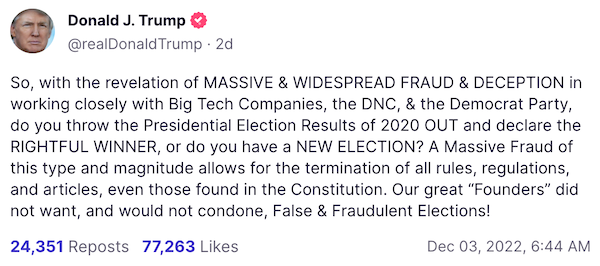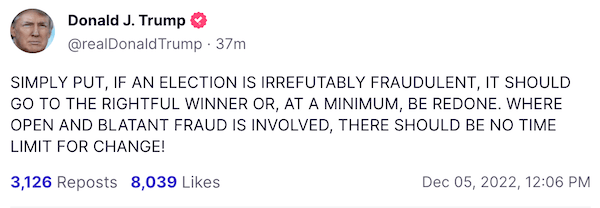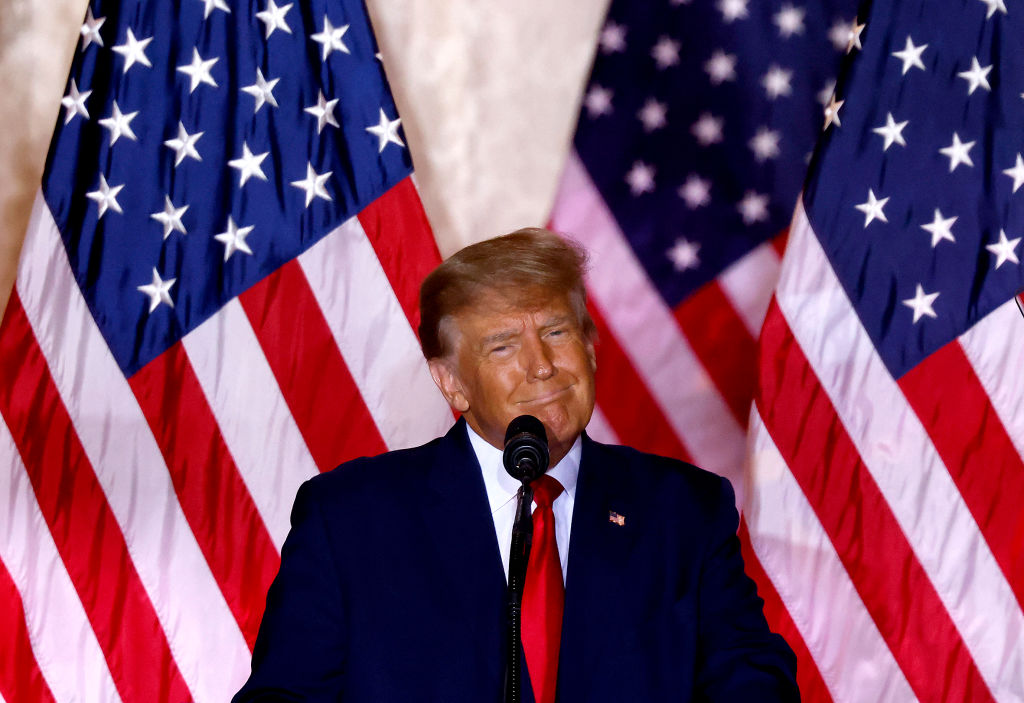Punditry is the easiest job in the world. Yet even easy jobs have their hazards.
We all make mistakes at work. But if you opine for a living and have any kind of readership, thousands of people are privy to those mistakes. And every flub is recorded for posterity by an Internet that never forgets.
Getting things embarrassingly wrong and having antagonistic strangers remind you unto eternity just how wrong you were comes with the territory.
A lesser known drawback of punditry, though, is getting things right and feeling miffed when your rightness goes unacknowledged.
Since January 6 there’s been a difference of opinion among longstanding conservative critics of Donald Trump. Some want the great man’s apologists in right-wing media, the so-called Anti-Anti-Trumpers, to admit publicly that we Never Trumpers had him pegged from the start. We warned them that Trump had autocratic instincts and couldn’t be trusted with power. They spent four years defending the party he remade in his image anyway. It ended with him attempting a coup and being impeached for a second time. They should, at long last, own it and confess error.
We were right. They were wrong.
Others, like me, think it’s foolish to make such demands. Harping on how right we were is destined to alienate some who spent six years making excuses for Trump but might, post-midterm, now be ready to cut the cord. If you’re looking to win converts to Never Trumpism, rubbing their faces in their terrible misjudgment is a strange way to break the ice. As for the incorrigible zombie partisans within the Anti-Anti wing, the unhappy truth is that not until Trump retires or is retired by voters will they allow that he’s unfit for office. He may yet end up as the Republican nominee in 2024, after all, the last thing standing between them and a second Biden term. They don’t want to turn on him too soon.
You know their motto: Better an autocrat than a Democrat.
Besides, why should we need contemptible MAGA apologists to admit we were right about him? We know we were right. And though they’d sooner chew glass than say so, they know we were right too.
Day by day, week by week, he keeps reminding them.
They got another reminder this weekend when Trump reacted to news of how Twitter suppressed the Hunter Biden laptop story in October 2020 with his usual aplomb.

A good way to gauge how badly he’s damaged himself with one of his misdeeds is if his fans immediately start insisting that your eyes have deceived you. That so many Trump sympathizers took to claiming after January 6 that the insurrection was a false flag staged by leftists or the “deep state” was their way of confessing that what happened was indefensible. It was so objectively terrible that they could only cope by speculating that their enemies rather than their hero must have been behind it.
We saw some of that on social media this weekend, too, after his “terminate the Constitution” post. Believe it or not, dear reader, some Trumpers have taken to arguing that he didn’t mean that he would terminate the Constitution if given the chance but that the alleged fraud perpetrated against him in 2020 has itself terminated the Constitution by voiding the social compact. This morning Trump himself took to claiming that he didn’t mean what he obviously meant, in fact.
He’s not a tyrant, he’s a victim. Isn’t he always?
I greeted his post about the Constitution as good news, though, and not just because it further weakened his chances at reelection in 2024. The best thing for this country would be for Trump to quit politics and return to a tranquil life of golf, adultery, and sh-tposting. But if that’s not in the cards, I agree with Tom Nichols that the next best thing is for him to run as the populist authoritarian he truly is, in full flower. If we must endure one last ride on the crazy train, let it be as crazy and autocratic as possible before the people render their judgment.
Let’s see Republicans argue that the avowed Constitution-shredder is the lesser of two evils on the ballot next time. (Spoiler: Some will.) Let’s find out who we are.
Some Trump critics will scoff at the insinuation in that last paragraph that Trump hasn’t always been an authoritarian in full flower. “It has been clear—from the beginning—that Donald Trump has no respect for the rule of law as a concept or the Constitution as a legal document,” Jonathan Last writes today at The Bulwark, citing numerous examples. Whether it’s the global ban on Muslims he proposed during his first campaign, his musing that American troops would obey his illegal orders in pursuit of terrorists, or that whole “overturning an election” business in 2020, Trump has never pretended to care about constitutional restraints on power. He’s spent 78 years of life trying to evade or destroy restraints on his desires. Go figure that he didn’t change his approach when he won the most powerful office on Earth.
Last is also right that it’s comical to imagine sitting Trump down and asking him to explain the basic purpose of the Constitution in broad terms. I’ve always thought of him as the most and least quintessentially American figure—the most inasmuch as he’s a showman, a huckster, and a grifter, the least in that he’s somehow completely unmoored from the country’s civic foundation. He admires violence as a political tactic, has no use for liberalism or democracy except inasmuch as they serve his own interests, and struggles with the concept that one shouldn’t benefit personally from the public office one holds.
He has the soul of an Egyptian policeman, which makes him a tragic figure in a sense. As phenomenally successful as he’s been in the United States, he’d be in his 30th year as dictator if he had been born in the Middle East or South America.
Trump is who he’s always been, and every Never Trumper in this country knows it. What may be different in 2024, though, is that his political “identity” has changed.
In 2016, Trump the authoritarian prevailed by presenting himself as Trump the change agent. After the party nominated and lost with uncharismatic but “electable” establishmentarians in 2008 and 2012, Trump offered something radically different. He ran against “the system,” promised to drain the swamp by confronting entrenched interests on both sides, and even made moves toward normalcy post-election when he chose esteemed figures like James Mattis for his Cabinet. It was possible—for some, if not for you and me—to imagine that he’d grow into the job and govern more or less responsibly.
In 2020, Trump the authoritarian nearly prevailed by presenting himself as Trump the economic dynamo. The prospect of normalcy faded quickly during his first term but figures like Mattis and Pat Cipollone had prevented him from doing anything too crazy. Yes, there were many “bad tweets,” but there was also gangbusters economic growth until COVID arrived. If you were a swing voter worried about the Democrats’ turn toward defunding the police, you might have gone to the polls in November 2020 preferring Trump as the man who’d get America back on its feet post-pandemic. You could trust him in his second term to behave … sort of responsibly? Responsible-ish, by Trump standards?
It’s not like he’d tried to stage a coup at that point, right?
In 2024, Trump the authoritarian is running as Trump the authoritarian. Rarely do you hear him talk anymore about building the wall or rebuilding the economy. Nothing animates him politically these days half so much as righting the wrong he believes he suffered in 2020, a wound to his narcissism that will never heal. There were reports last year about Trump believing privately that he might be reinstated as president before the end of Biden’s term, rumors that seemed too insane to be true. Now he talks openly about that scenario, demanding a plainly impossible do-over even if the Constitution stands in the way.

He’s deteriorating psychologically in plain sight. No matter how many times Republicans nudge him elliptically in interviews by stressing that voters are focused on the future and certain unnamed party leaders should focus similarly, Trump returns compulsively to his hobby horse. Whatever gestures he made to normalcy during his first two runs for president at his advisers’ behest to try to reassure jittery swing voters are gone now.
You saw it too with his recent dinner with Kanye West and Nick Fuentes. Cooler heads tried to intervene, per NBC. They failed.
Some in Trump’s orbit had cautioned him not to have dinner with Ye, under fire for antisemitism, in the first place, according to two sources who had been briefed on an internal damage assessment the campaign performed after the controversy erupted.
But Trump is known for refusing to heed cautious counsel, guardrails and gatekeepers. So he went ahead with the dinner alone, telling confidants that he thought Ye needed his counsel. One confidant told NBC that Trump acknowledged he wanted the rapper to be seen because “it would be fun for the members” of Mar-a-Lago.
Philip Klein drew the correct lesson from that episode, which I suspect many formerly Trump-curious voters are also beginning to draw. It was a window into what a second Trump term would look like. A man who’s dining with antisemites and babbling about terminating the Constitution is a man who’s no longer making a pretense of feeling bound by the traditional norms of American politics. He’s now Trump Unleashed. Rich Lowry recently stared into the abyss of reelecting him: “After having promoted election conspiracy theories since 2020, attacked promising next-generation Republican politicians, and generally behaved with monumental selfishness without any of it preventing him from re-taking the White House, Trump would conclude that there’s nothing he can plausibly do to alienate his supporters or disqualify himself from high office.”
Assessing this weekend’s Truth Social post, Charles Cooke put it more bluntly: “Ahead of time, Trump is informing us that he aspires to be a tyrant. Sic semper tyrannis.”
The prospect of Trump spending the next 18 months on the trail spiraling further downward into overt authoritarianism has me considering a possibility that borders on scandalous for a Never Trumper, one of those things I might get embarrassingly wrong in print and be taunted with by my detractors for years to come. Are you ready for it?
Here it is. I’m beginning to think Bret Stephens is right that Trump is no longer electable. The threat really might have passed.
Any prediction about his electoral chances is haunted by the ghost of 2016 and the reality that elections are driven by events, dear boy, events. In a bad enough global economic climate, the GOP could nominate Marjorie Taylor Greene in 2024 and win.
Although that climate would need to be awfully bad.
Two things have changed in the last six years, however. There’s now an alternative to Trump in the person of Ron DeSantis, who’s broadly acceptable to the MAGA right and to the Republican establishment in ways Ted Cruz wasn’t. And evidence keeps accumulating that Trump and his proxies are a drag on the party, forcing even some loyalists to consider that owning the libs in 2024 may require a different choice of nominee.
“Trump is unfit for office” is substantively correct but unpersuasive to the sort of zombie partisan who cares only about keeping Democrats out of power. “Trump is Democrats’ best hope of retaining power” is right in the zombie’s wheelhouse, though. Compare the following tweets reacting to his “terminate the Constitution” post this weekend. First, Liz Cheney:
Second, Ben Shapiro:
Cheney’s view is the Never Trump view, a moral judgment of Trump’s unfitness. “An enemy of the Constitution,” she calls him, correctly. That indictment will resonate with, oh, 10 percent or so of the party.
Shapiro’s view is the Anti-Anti-Trump view, devoid of moral judgment. Trump’s real sin in wanting to suspend the Constitution was … strategic, he claims. Elon Musk gave him a gift by exposing how liberals at Twitter suppressed a news story that would have helped Trump in 2020, and Trump promptly set that gift on fire by turning it into a news cycle about his authoritarian tendencies.
Only Shapiro knows whether he believes that “jumping on a rake” politically is the real problem with what Trump said or if it’s one more moral concession he’s been forced to make to stay on the good side of his vast Trump-loving populist readership at The Daily Wire. But there’s no doubt that his argument for why Trump is a poor choice for nominee in 2024 will appeal to more Republicans than Cheney’s will. “Nominate Trump and you’ll be governed by a right-wing authoritarian!” she says, and most shrug. “Nominate Trump and you’ll be governed by a Democrat!” Shapiro retorts. In this nihilistic, power-worshiping party, it’s advantage: Shapiro.
Mitch McConnell also understands what his base will and won’t tolerate. After Trump had dinner with West and Fuentes, he warned that anyone willing to do such a thing is unlikely to be elected president. Note: Not that they shouldn’t be elected president, which would be partisan treason. Just that they’re not likely to be.
The most pitiful version of this strategy played out yesterday on This Week, when GOP Rep. Dave Joyce was asked his opinion about Trump’s post. I’ll support the Republican nominee even if it’s the Constitution-shredder, Joyce dutifully pledged—before reminding his host that the 2024 field is shaping up to be a big one.
Shapiro, McConnell, and Joyce are making the same point, half-hope and half-prediction. They think Trump has become unelectable, or at least much less electable than DeSantis is (which is true.) And the more Republican voters are persuaded that they’re right, the more likely the 2024 primaries are to solve the party’s Trump problem at long last.
A month ago the idea of populist conservatives ousting Trump on electability grounds would have sounded like fantasy. Post-midterm, it might have legs. Sean Trende made an arresting point about the results a few days ago:
I’ve made a similar point, that there’s reason to believe democracy really was on the ballot for swing voters in November. More evidence has since emerged. Per HuffPost:
[O]ne poll of the 71 most competitive House districts backs up the importance of the democracy issue in Democrats’ midterm success. Concerns about threats to democracy motivated Democrats and independents to turn out while also helping independents decide to vote for Democrats, according to a voter survey from Nov. 11-16 by Impact Research, a Democratic polling firm.
…
Forty-one percent of voters who cast ballots for Democrats said protecting democracy was one of the top two reasons for voting as they did. It was the top reason among voters surveyed, listed only slightly above abortion (39%) and not liking the Republican candidate (38%).
The issue also likely moved some Republican voters to cross over and cast ballots for Democratic candidates. Sixty-four percent of Republicans who voted this way said their biggest concern was Republican candidates supporting former President Donald Trump and (incorrectly) believing that the 2020 election was stolen from him.
Other polling supports the belief “rigged election” crankery is chasing moderate Republican voters across the aisle and into the arms of Democrats. A recent survey from Marquette found DeSantis’ favorable rating among college-educated Republicans at 80-9. Trump’s rating in the same cohort was 48-50. The same poll had Biden tied with DeSantis in a hypothetical 2024 race—but ahead of Trump by 10 points.
The dismal results for election deniers on the ballot last month were no coincidence. Trump’s obsessions are killing his party. Some Republican voters will have noticed.
This is all quite cynical and shallow.
A movement less sick at heart than populist conservatism wouldn’t find Trump’s descent into naked authoritarianism troubling for strategic more so than moral reasons. That they do raises the possibility that if Trump can find a way to make Constitution-shredding work strategically, his new critics in the GOP will declare themselves no longer troubled. David Frum wrote recently about the unspoken “deal” between Trump and the party he co-opted, in which voters agree to defend anything he does in return for him delivering electoral victories. That deal with the devil is now at risk of being broken, but not because Republican voters have grown squeamish about selling their souls. It’s because, post-midterm, the devil suddenly isn’t holding up his end of the bargain.
“If the deal is in danger now, it’s not because Trump got worse. He’s the same. His party is the same,” Frum warns. “Only the political calculations have possibly changed. If it turns out those calculations haven’t changed, have no doubt: The deal will be on again.”
It’s true, there’s no amount of disgrace Trump’s supporters won’t indulge him provided he rewards their loyalty with power. The dishonor in which they’ve bathed themselves will never wear off.
My question is this, though: Realistically, isn’t Trump all but destined to become less and less electable between now and 2024?
He’ll continue to obsess about 2020. He’ll continue to concoct insane conspiracy theories to explain his setbacks. He’ll continue to ignore aides who suggest he run a normal, forward-looking campaign. He’ll eventually enrage the party’s many DeSantis fans by attacking the governor irresponsibly. Meanwhile, he may be indicted, potentially by federal and state prosecutors. If he overcomes all of it to win the nomination, he’ll have alienated so many non-populist Republicans in the process that it’s hard to imagine how he’d reassemble a winning coalition in the general election.
We have proof of concept from the midterms that there’s a pro-democracy majority out there willing to punish election deniers. They’re going to turn out in force in 2024 to punish the election-denier-in-chief, especially once he’s spent two years further weakening himself by running on the following message.
A Never Trumper should never take Trump for granted. Anything Can Happen, the wise men say, and they’re right. But I think a second Trump term has moved from toss-up territory probability-wise to something more like a tail risk. Tail risks can be cataclysmic when they happen, but Trump letting his inner MAGA Mussolini out means 2024 isn’t a coin flip anymore. He’s destroying himself, and will continue to do so.
I’m confident the general electorate will do the right thing if given the chance to render one last verdict on him. And I’m glad, sort of, that Republican voters will be asked to render a verdict of their own in a primary. However they rule, we’ll learn something important about them. And about whether this party is worth ever supporting again.







Please note that we at The Dispatch hold ourselves, our work, and our commenters to a higher standard than other places on the internet. We welcome comments that foster genuine debate or discussion—including comments critical of us or our work—but responses that include ad hominem attacks on fellow Dispatch members or are intended to stoke fear and anger may be moderated.
With your membership, you only have the ability to comment on The Morning Dispatch articles. Consider upgrading to join the conversation everywhere.